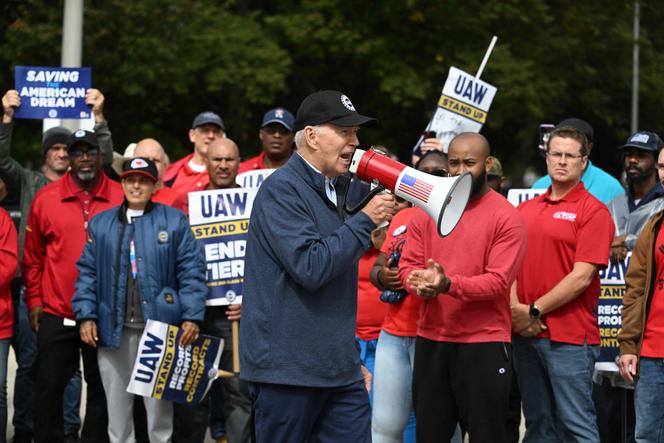


Joe Biden has always defended the role of unions and he remains the only US president to have visited a picket line, in September 2023. Megaphone in hand and wearing a United Auto Workers cap, he defended significant increases for workers at General Motors, Ford and Stellantis, in the key re-election state of Michigan. His support for blue-collar workers never wavered, even when dockworkers paralyzed ports along the Atlantic seaboard and the Gulf of Mexico on Monday, October 1.
Biden defended their wage demands against port authorities and, above all, shipping container owners who, he claimed, made huge profits during the Covid-19 crisis. "Now is not the time for ocean carriers to refuse to negotiate a fair wage for these essential workers while raking in record profits," he wrote in a statement, released on Monday.
The White House also got involved in the Boeing dispute by appointing a federal mediator – to no avail so far. And, at the end of 2023, Biden involved his acting secretary of labor, Julie Su, in the successful negotiations at Kaiser Permanente, one of the country's leading private healthcare groups.
During his 2019 campaign, the candidate presented himself as a worthy heir to the New Deal of Franklin D. Roosevelt and his predecessors in the 1960s. He pledged to strengthen worker organizing, collective bargaining and unions in a country where barriers to union rights are commonplace. But while the number of disputes has risen, the trend is due less to presidential support than to full employment, which strengthens employees' bargaining power.
The man who describes himself as "the most pro-union president" in US history – in the name of defending the middle class – has not succeeded in his bid to revive it. Only one in 10 workers (14.4 million) were union members at the end of 2023, barely more than at the start of his mandate, with a rate five times higher among civil servants and an over-representation of African-American employees.
Unions are suffering a slow atrophy. Still powerful in the 1950s-1970s, unions were wiped out in the 1980s by Ronald Reagan's liberal shift. This policy came into force a few months after his election, with the dismissal of 11,000 striking air traffic controllers. Nor have they recovered from the collapse of entire sectors of the "old economy" (coal, steel, etc.), or from the harassment of managers viscerally hostile to any form of employee representation.
Despite sporadic attempts, employees of Big Tech companies such as Amazon, Apple and Google, and large corporations like Starbucks, have not picked up the baton. They remain union wastelands, as much due to the opposition of Silicon Valley tycoons as to the lack of interest shown by their employees. However proactive a president may be, he can't do everything.
